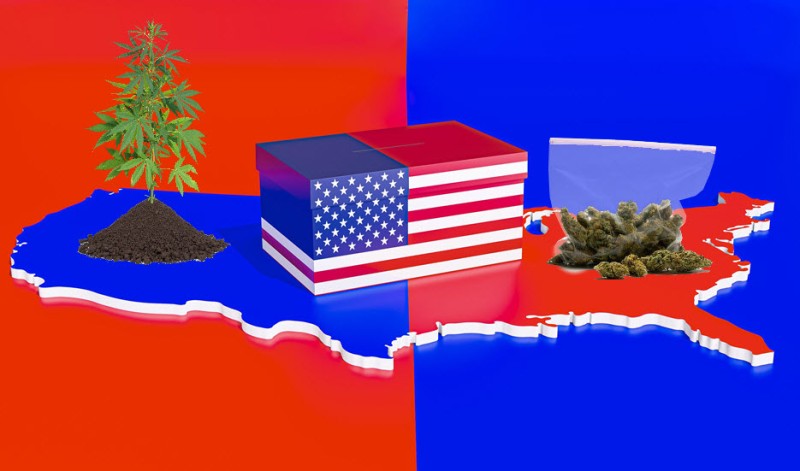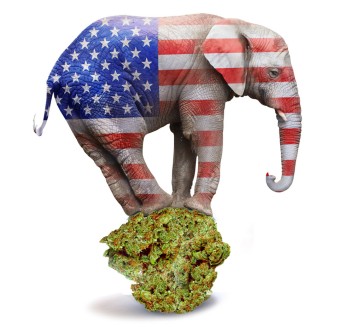
Is West coast Coming to the East coast Menu?
The push for interstate commerce is accelerating
In the National Lampoon’s 1978 comedy film, Animal House, Dean Wormer privately announced his intention to place fraternity Delta Tau Chi on probation. When he learned they already were on probation, he announced they would be placed on “double secret probation.”
I doubled down recently on my bet that interstate commerce will happen not through legislation, but through the courts. The industry’s big 3-day conference, MJBizCon, starts November 15, 2022. Jason Reposa of Good Feels cannabis infused beverages is attending and tagged me in a comment to a post about an Oregon distributor suing the state on interstate trade.
Well today, like a five-year-old who double dares his friend, I’m going to triple down on my prediction from April. The plaintiff, Jefferson Packing House, sued the state of Oregon. Alex Halperin of Weed Week did a great job of reporting on this. Here is a link to their original article, which lifts quotes from the complaint (and which I lift from them). Weed Week also provided a link to the complaint – if you’re into the crystal ball of where the industry is going, this is a must read.
Jefferson Packing House (JPH) argues that the states cannot impugn interstate commerce of cannabis – that requires federal action, and that such action is the domain of the legislative branch, not the Department of Justice. The lawsuit is relatively succinct and only about an 8-page read.
When the federal government quietly sanctioned state marijuana programs, they did so by issuing a series of guidance memos, authored by Deputy United States Attorney David Ogden in 2009 and continuing in 2011, 2013, and 2014 with three memos by Deputy United States Attorney James Cole. The Cole memos are well-cited, and Cole #2 set out 8 federal enforcement priorities. In simple language, the feds said the marijuana remains illegal, but they have limited enforcement resources and there therefore will not focus on those states whose regulations cover the 8 important federal issues.
When a dream-team of plaintiffs, led by former professional football player Marvin Washington sued the federal government, they put forth a compelling argument which appeared to some observers to be a winner. To counteract that argument just before an important hearing, (the argument relied upon the federal guidance memos), Attorney General Jeff Sessions rescinded the guidance memos. Interestingly, when asked about marijuana, the replacement Attorney General Bill Barr responded that he found the disconnect between state and federal laws “intolerable,” but he acknowledged he had other priorities and felt the Cole memo guidelines seemed to be working fine (even if the memo had been rescinded by his predecessor).
To understand the Oregon suit, one must understand the 8 enforcement priorities:
“The Department is also committed to using its limited investigative and prosecutorial resources to address the most significant threats in the most effective, consistent, and rational way. In furtherance of those objectives, as several states enacted laws relating to the use of marijuana for medical purposes, the Department in recent years has focused its efforts on certain enforcement priorities that are particularly important to the federal government:
-
Preventing the distribution of marijuana to minors;
-
Preventing revenue from the sale of marijuana from going to criminal enterprises, gangs, and cartels;
-
Preventing the diversion of marijuana from states where it is legal under state law in some form to other states;
-
Preventing state-authorized marijuana activity from being used as a cover or pretext for the trafficking of other illegal drugs or other illegal activity;
-
Preventing violence and the use of firearms in the cultivation and distribution of marijuana;
-
Preventing drugged driving and the exacerbation of other adverse public health consequences associated with marijuana use;
-
Preventing the growing of marijuana on public lands and the attendant public safety and environmental dangers posed by marijuana production on public lands; and
-
Preventing marijuana possession or use on federal property.
These priorities will continue to guide the Department's enforcement of the CSA against marijuana-related conduct. Thus, this memorandum serves as guidance to Department attorneys and law enforcement to focus their enforcement resources and efforts, including prosecution, on persons or organizations whose conduct interferes with any one or more of these priorities, regardless of state law.”
This big issue that states took to heart was priority #3: Preventing the diversion of marijuana from states where it is legal under state law in some form to other states. The states interpreted this to mean nothing leaves our borders and they crafted regulations accordingly. As Vanderbilt Law School professor Robert Mikos argues, the feds never specifically stated there could be no interstate commerce and his insightful white paper, Interstate Commerce in Cannabis, published by the Boston University Law Review in the summer of 2021, points out that the states may have misinterpreted this enforcement priority. His alternative reading includes adding the words “where it isn’t legal” to the end of the sentence.
Cannabis commerce between two states, each having a legal market with regulations that support the 8 enforcement priorities might not turn heads at the DOJ. That appears to be the direction where Jefferson Packing is headed. We highlight some of their best arguments below.
7. The self-evident purpose of the ban on export is to keep Oregon marijuana and marijuana products within the state of Oregon, discriminating against Oregon marijuana growers, processors, and wholesalers, like JPH, by denying them the opportunity to market and sell their products in other states. The export ban harms not only Oregon growers, processors, and wholesalers, but also non-residents, who are denied access to the high-quality marijuana products created in Oregon unless they physically travel to Oregon to purchase those products.
8. The export ban should be struck down because it violates the dormant Commerce Clause of the United States Constitution by discriminating against and unduly burdening interstate commerce.
18. The export ban discriminates against interstate commerce by nakedly prohibiting such commerce, without any legitimate, nonprotectionist purpose, and is therefore prohibited by the dormant Commerce Clause of the U.S. Constitution (“DCC”).
19. There is no constitutionally adequate reason for Oregon, or any other State, to bar the import or export of marijuana.
20. Protecting the local cannabis industry is a purely protectionist motive and is therefore plainly unconstitutional under the DCC.
21. Attempting to appease the perceived enforcement priorities of the federal government to induce the DOJ to continue its policy of nonenforcement of state-legal marijuana activities (which violate federal law equally as much as interstate commerce in marijuana) implicates fatal separation of powers concerns, as only Congress can authorize the States to regulate interstate commerce, not the DOJ, an agency of the executive branch. “The DOJ cannot use enforcement treats to supply the states with a convenient nonprotectionist excuse for restricting interstate commerce in cannabis because that would be tantamount to authorizing the states to restrict such commerce.” Robert A. Mikos, Interstate Commerce in Cannabis, 101 B.U. L. Rev. 857 (2021).
As reported by Alex Halperin, “In an accompanying letter to Oregon Gov. Kate Brown and other state officials, the plaintiff’s lawyers cite a recent Maine case where a federal appeals court ruled the U.S. Constitution’s dormant Commerce Clause (DCC) blocked the state from imposing residency requirements on MED license holders. ‘This decision indicates a growing consensus within the courts to view marijuana commerce the same as any other commerce,’ the letter states.”
Halperin continues to quote the letter: “Under the DCC, for example, an Oregon law prohibiting the export of hazelnuts (or grapes, semiconductors, Bigfoot decals, etc.) would be invalidated,” the letter says. “We believe it is likely that a federal court will…invalidate state laws” prohibiting cannabis exports, despite federal illegality.
In a Forbes article published November 3, 2022, Professor Mikos argued companies could pry open interstate markets by suing states, and predicted the lawsuits could begin in 12-18 months.
Looks like “months” was just reduced to weeks or days.
Anyone interested in some good west coast weed?
Comments? Hit me up. DavidR@CannaVentureLabs.com or drabinovitz@gmail.com. Text me at 617-281-0710.
David Rabinovitz is a cannabis business consultant in Massachusetts and involved in various cannabis ventures. He is a former Director and Treasurer of MassCann (the Massachusetts Cannabis Reform Coalition), a past Trainer for the Massachusetts Cannabis Control Commission Social Equity training program, and the original host of The Green Rush cannabis business talk show on ProCannabis Media. David speaks at various industry events on creating winning financial presentations that investors love. David’s industry insights and analysis are featured in several media outlets. Connect with David on LinkedIn at https://www.linkedin.com/in/davidrabinovitz/ or reach out to him at drabinovitz@gmail.com or DavidR@CannaVentureLabs.com
MORE BY DAVID RABINOVITZ, READ ON...
THE GREATER FOOL - HOW MUCH DOES A FREE CANNABIS STORE COST?







